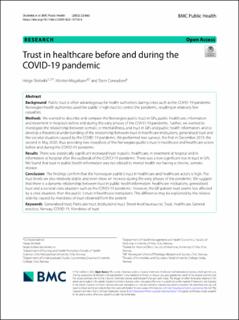Trust in healthcare before and during the COVID-19 pandemic
Peer reviewed, Journal article
Published version
Permanent lenke
https://hdl.handle.net/11250/3112661Utgivelsesdato
2023Metadata
Vis full innførselSamlinger
Originalversjon
10.1186/s12889-023-15716-6Sammendrag
Background Public trust is often advantageous for health authorities during crises such as the COVID-19 pandemic.
Norwegian health authorities used the public´s high trust to control the pandemic, resulting in relatively few
casualties.
Methods We wanted to describe and compare the Norwegian public trust in GPs, public healthcare, information
and treatment in hospitals before and during the early phases of the COVID-19 pandemic. Further, we wanted to
investigate the relationship between somatic or mental illness, and trust in GPs and public health information, and to
develop a theoretical understanding of the relationship between trust in healthcare institutions, generalised trust and
the societal situation caused by the COVID-19 pandemic. We performed two surveys, the first in December 2019; the
second in May 2020, thus providing two snapshots of the Norwegian public’s trust in healthcare and healthcare actors
before and during the COVID-19 pandemic.
Results There was statistically significant increased trust in public healthcare, in treatment at hospital and in
information at hospital after the outbreak of the COVID-19 pandemic. There was a non-significant rise in trust in GPs.
We found that trust in public health information was not related to mental health nor having a chronic, somatic
disease.
Conclusion The findings confirm that the Norwegian public’s trust in healthcare and healthcare actors is high. The
trust levels are also relatively stable, and even show an increase during the early phases of the pandemic. We suggest
that there is a dynamic relationship between trust in public health information, healthcare institutions, generalised
trust and a societal crisis situation such as the COVID-19 pandemic. However, the GP-patient trust seems less affected
by a crisis situation, than the public´s trust in healthcare institutions. This difference may be explained by the relative
stability caused by mandates of trust obtained from the patient.

